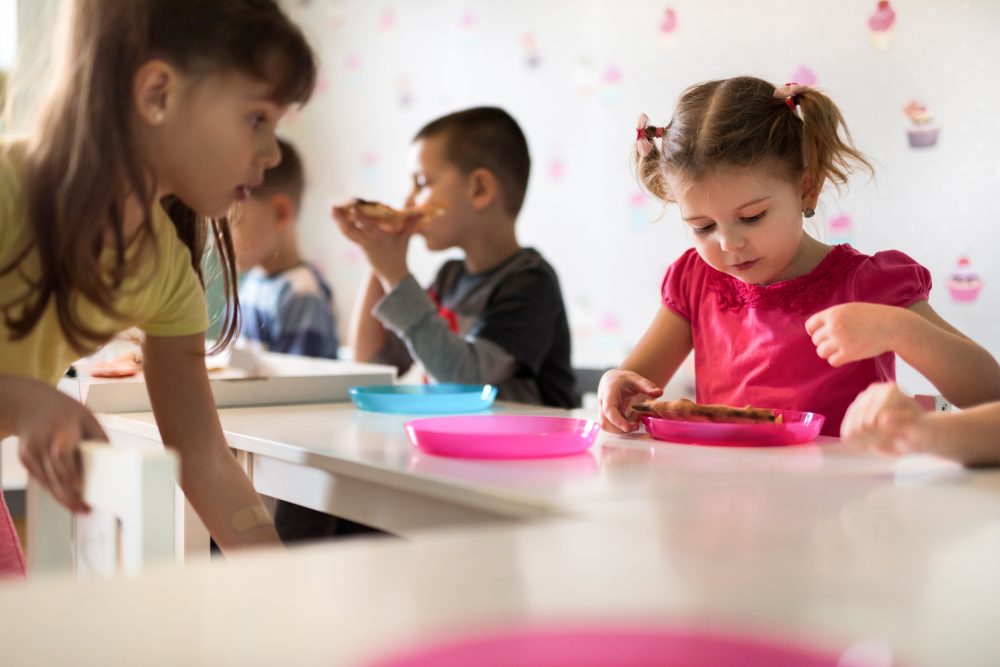Multiple children are in hospital with severe food Salmonella poisoning after eating contaminated food provided by a third-party supplier while at nursery in Dubai, according to sources verified by SchoolsCompared.
Reports of severely sick children and babies as young as one year old being hospitalized with dehydration, vomiting and diarrhoea caused by the salmonella bacteria have been circulating on social media, with children from at least four different Dubai-based nurseries thought to be infected.
A letter seen by SchoolsCompared was sent to parents who subscribe to a third-party catering service – which provides baby- and toddler-friendly meals to multiple nurseries / Early Learning Centres across the UAE – describing how the lunch served on Thursday 27 October 2022 has been connected to reports of several children being unwell. The meal delivery service kitchen is currently closed pending an investigation:
Dear parents,
It came to our attention that there has been an issue with Thursday’s 27/11/2022 [sic] lunch as some kids have been reported to be unwell, that are on our food catering. Please note that we are doing a thorough investigation and have a team of specialist coming into our kitchen to find out what happened. That being said, we are inclined to close our kitchen until this has been sorted. We thank you for your continuous trust and understanding.
meal subscription service letter redacted
SchoolsCompared spoke exclusively to one mother, who asked to remain anonymous for this story, whose one-year-old son is currently in hospital in Dubai suffering with Salmonella poisoning caused by eating this contaminated lunch while at nursery on Thursday. She explains how the food poisoning first manifested for her little boy:
“Friday night my 21-month-old son woke in the middle of the night with a very high fever, 40˚C. He was crying for water.
“All Saturday he had a fever, which was barely kept under control with paracetamol syrup. He was lethargic and lying on the ground most of the day.
“By 5pm on Saturday he started complaining about his tummy and the fever was very high.
“I took him straight to the hospital emergency room and they swabbed him and diagnosed him with a respiratory infection. At this point he had no respiratory symptoms, so I believe the swab must have picked up remnants of an old virus from two weeks prior, when he did have a respiratory infection.
“We took him home and monitored the fever. Throughout the night his fever reached 41˚C and he began to vomit and suffer from diarrhea.
“On Sunday he seemed to improve a little, but by this point I had been made aware that multiple children from his nursery and others were suffering from food poisoning. I took him to the doctor at a clinic, who requested a stool sample.
“Monday morning I rushed to the clinic with his stool sample as he was suffering from a lot of diarrhoea, but the vomiting had stopped. At this point any time he ate or drank anything, even water, he was passing it immediately, with a lot of pain in his tummy.
“We returned to hospital Monday afternoon and they did a blood test, which found a high infection marker.
“We were admitted to the hospital and got our room at 8pm last night. He has been on fluids and anti-diarrhoea medication all night and has been in severe pain.
“At 4am this morning we got the diagnosis of the stool sample from the clinic that it is positive for Salmonella bacteria (no E-coli present).
“We know the Salmonella came from Thursday’s meal, which was provided by the third-party meal-subscription service.”
The mother, who is also manager of the nursery that her son attends, told SchoolsCompared about her experience from the professional angle too.
“I found out from my colleagues working at other nurseries that there were children on the same meal plan who were unwell. I spoke directly to the team at the meal-delivery service, who were unaware of this issue. It wasn’t until Saturday that they communicated with all parents on the program. That is when I linked the case to my son.”
She then reached out in her professional capacity to the families at her nursery to check on the health of their children:
“As a Nursery Manager I then contacted all the families in the nursery one by one to check in on the health of the children and found them to be unwell, too. We have been in constant communication, keeping each other updated on the situation.
“One child from my nursery is also here in the same hospital as us, and his symptoms have been severe since Saturday. He is hopeful to be discharged today. The nurse told me there are eight other children on the ward with the same complaint.”
“I have been using this meal-delivery service for two years for both my kids and I have never had any other issue to date.”
“I know a lot of the parents with sick little ones feel unsupported by their respective nurseries. But, as a Nursery Manager, I also know that we don’t have any concrete information other than the initial letter sent out by the meal subscription service.”
“In our nursery the parents sign up direct with the supplier. The nursery itself is not involved, other than serving the food to the children. The supplier puts it in the fridge immediately when they deliver.”
SchoolsCompared contacted the meal subscription service for comment but have not received a reply.
According to the UK’s National Health Service, Salmonella bacteria are often found in raw or undercooked meat, raw eggs, milk, and other dairy products. It usually takes between 12 hours to three days after eating the infected food for symptoms to appear (although it can be up to six days or longer), and the symptoms usually last around four to seven days.
The mother we spoke to urges other parents to be vigilant and consider possible food poisoning if your child is unwell:
“For other parents, please take the symptoms of vomiting, diarrhea with high fever seriously. Young children get dehydrated quickly. If you believe it is food poisoning, insist on blood tests or stool samples before the infection gets worse.”
Who ensures food served at Dubai nurseries is safe?
SchoolsCompared spoke to the Dubai education authority, the KHDA (Knowledge and Human Development Authority) – which regulates nurseries in Dubai – and the Dubai Health Authority, both of whom confirmed that the safety of food served at nurseries is under the remit of Dubai Municipality.
SchoolsCompared has reached out to Dubai Municipality for comment but had not received one at the time of publishing.
According to the ‘Guide to Healthy and Nutritious Food Practices in School Canteens’ by the Dubai Municipality and Dubai Health Authority, published in 2011, there is a specific protocol to be followed when a case of food poisoning is suspected in schools:
“Institutional measures and steps in the event of a suspected food poisoning:
- Identify the persons in charge in advance to follow up cases of food poisoning.
- Develop written procedures to help the institution to detect cases of poisoning. These procedures should be valid with the official school health officer and should include the following:
- Record the case in a special form which should include information about food handlers who were sick along with the symptoms
- Ensure there are no cases among students and record, if any.
- Recall suspected food and store in a way that maintains their specifications.
- Inform the related health authorities in case more than one case of food poisoning was found.
- Transfer the cases to medical centres for testing and treatment.
- Follow up the situation and record the results.

Food poisoning protocol illustration from ‘Guideline to Healthy and Nutritious Practices in School Canteens’ by Dubai Municipality
Food Handler’s Hygiene Requirements
- All food handlers should be fit and have a valid health card (they should be allowed to carry out the business only after undergoing a medical examination by the competent health authorities, and this shall be done periodically according to the applicable laws).
- Making sure to take the necessary vaccinations, especially hepatitis vaccination.
- Wearing a clean and suitable uniform like hair net, protective clothing, appropriate shoes required during work in work premises like the preparation area, service area and others.
- All handlers in canteens that prepare, cook and serve food should attend special training on food safety basic principles as per Dubai Municipality requirements.
- The number of workers in the canteens should be suitable with respect to the size of the canteen, the presence of any unauthorized person inside the canteens is not allowed.
- Providing documented records of cleaning programs.
- Handlers suffering from any disease or carrying any pathogens should stop working even if they do not show symptoms, or if suffering from an inflamed wound, skin infections or boils until complete recovery from illness or until it is found to be no longer infectious .
- Any handler showing symptoms such as diarrhoea, vomiting, fever, abdominal cramps, throat inflammation, skin rash or any other disease symptoms should immediately inform the person in charge.
According to the Dubai Municipality guidance for serving food in schools, published in 2017, the following guidelines apply:
ROLES AND RESPONSIBILITIES OF SCHOOLS
Schools should ensure that food procurement is done only from food facilities that have a valid trade license with the relevant business activity (such as catering services) listed in the license.
The food business in Dubai that supply food to schools should have a green or white inspection card. Red and Yellow inspection card indicates serious food safety failure and such food establishments should not supply food to schools.
The school management should verify with the Food Inspection Section of the Food Safety Department the details of the food inspection when the supplier is not able to provide the details. The school management should ensure that the supplier has all facilities to transport and store foods appropriately. Further information can be found in the Food Code here.
School management must ensure that the food supplier has the relevant and valid permit from Dubai Municipality Food Safety Department to supply foods and beverages to schools and only the foods listed in the permit are sold.
Any change in the approved menu requires another approval from Dubai Municipality School management should periodically verify that the products comply with the nutritional requirements listed in these guidelines.
School should seek expertise when necessary, either internally or externally, or from the Food Safety Department to ensure that food suppliers meet the regulations.
ROLES AND RESPONSIBILITY OF THE FOOD SUPPLIERS
Food businesses that supply food to schools shall obtain a valid permit from the Food Safety Department to supply food to schools.
The food supplier shall not provide any other foods other than the foods that have been approved by the Food Safety Department.
Have you been affected by the food poisoning outbreak? Please contact us in complete confidence: [email protected].
© SchoolsCompared.com. A WhichMedia Group publication. 2022. All rights reserved.































































Leave a Response